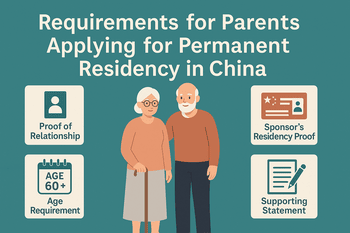
For expats seeking China permanent residence, the process of gathering the right documents can be a daunting task—especially when family members are joining your application.
Securing a Chinese permanent residence, often referred to as a “Chinese Green Card,” is not only about meeting personal eligibility criteria but also ensuring that all family members’ documents are accurate and complete.
In this guide, we dive into the essential documents, how to prepare each one, and tips to optimize your application processing.
Why Proper Documentation Matters
For both the primary applicant and family members, complete and accurate documentation is key to a successful application for China permanent residence.
Chinese immigration authorities scrutinize every file to verify identity, relationship, health status, and financial reliability.
Missing or incorrectly verified documents can lead to delays or even rejection of the application.
Therefore, a detailed approach—ensuring every paper is correct, notarized when necessary, and translated into Chinese if required—is crucial for expediting the process.
Who Qualifies for Family Applications?
Family members applying alongside you typically include your spouse, dependent children, and sometimes even dependent parents.
Each applicant must independently satisfy the Chinese immigration requirements while the relationship documents—such as marriage and birth certificates—establish the familial connection.
Some of your family members may be eligible for reunification provisions or special family visa categories.
It’s essential to keep updated with the local immigration bureau guidelines because document requirements may vary slightly based on family role and local jurisdiction.
Essential Documents for Family Members
The documentation for family members applying with you comprises several key categories.
Below, we outline the primary documents, their purposes, and additional notes to ensure nothing is overlooked:
1. Identity Documents
- Valid Passport:
Every applicant must hold a passport valid for at least six months beyond the intended duration of stay in China. This verifies identity and nationality. - Current Chinese Visa:
The visa used to enter China is required to prove lawful entry. The entry stamp must be clearly visible.
2. Relationship Proof
- Marriage Certificate:
To establish a spousal relationship, the certificate should be original, notarized, and if issued in a language other than Chinese, appropriately translated by a certified translator. - Birth Certificates:
Children must provide birth certificates to prove parent-child ties. Ensure that the details (names, dates, and places) correspond with those on the primary applicant’s documents.
These documents are essential for confirming relationships and, in some cases, demonstrating compliance with local family reunion conditions.
3. Application Forms & Photographs
- Completed Application Forms:
Each family member needs to fill out the designated application form for the permanent residence permit. The form should be completed accurately—any mistakes can lead to processing delays. - Passport Photos:
Typically, two recent, color passport photos are required per applicant. They should have a white or light blue background, following the specifications provided by local authorities.
4. Health and Background Checks
- Health Certificate:
A health certificate (or medical examination report) from a designated hospital ensures that the applicant meets the required health standards. This certificate is essential for all applicants, including children, in many cases. - Police or Criminal Background Check:
A non-criminal record or police clearance certificate from your home country is usually required, further establishing that the applicant poses no security risks.
5. Proof of Accommodation and Financial Stability
- Proof of Accommodation:
Submit documents that verify your housing situation in China—this could be a rental agreement or property ownership documents. Ensuring stable accommodation is an important part of the application. - Financial Statements or Employment Letters:
While these are more commonly required for the primary applicant, some family applications may require evidence of adequate financial means which can include bank statements or a letter from your employer.
6. Additional Notarized Documents
- Translations and Notarizations:
All documents not originally in Chinese must be translated by an authorized translator and notarized. This helps to avoid any misinterpretation or delays due to language barriers.
Comparative Overview in a Table
The following table summarizes the documents, their purpose, and some additional notes to help you keep track of your preparation:
| Document | Purpose | Additional Notes |
|---|---|---|
| Valid Passport | Verifies identity and nationality | Must be valid for at least 6 months beyond the planned stay |
| Current Chinese Visa | Confirms lawful entry into China | Ensure that the visa entry stamp is clearly visible |
| Completed Application Form | Official documentation required for the application | Must be filled carefully; available from local Public Security Bureau offices |
| Passport Photos | Identification and verification | Usually require two photos with a white or light blue background |
| Marriage Certificate | Establishes the spousal relationship | Must be notarized and translated if not in Chinese |
| Birth Certificates | Proves parent-child relationship | Ensure details match those in other application documents |
| Health Certificate | Confirms the applicant’s general health | Issued by a designated hospital in China |
| Police Clearance Certificate | Verifies that there’s no criminal history | Obtain this document from the applicant’s country of origin |
| Proof of Accommodation | Validates stable housing arrangements in China | Rental agreement or property ownership documents |
| Financial Statements | Demonstrates financial stability (if required) | Bank statements, employment letters, or other supporting documents |
| Notarized Translations | Confirms documents in a language easily understood by authorities | Required for any document not originally issued in Chinese |
Practical Tips to Expedite Your Application
Double-Check Document Consistency
Ensure that all documents contain consistent information—mistakes in names, dates, or numbers can result in your application taking longer to process.
Keep Multiple Copies & Digital Scans
Maintain several copies of every document, both in paper and digital formats.
This helps safeguard against loss and speeds up resubmission in case any document is misplaced.
Verify Local Requirements
Immigration authorities in different regions may demand additional or slightly different documentation.
Before submission, verify requirements with your local Public Security Bureau (PSB) or through a legal advisor specializing in immigration.
Use Professional Translation Services
Documents not issued in Chinese must be translated professionally.
Incorrect translations can lead to misunderstandings and possible denials, so invest in high-quality translation services.
Consult with a Legal Expert
Due to the complexities involved in the permanent residence application for families, consulting with immigration lawyers or professionals can significantly streamline the process.
They can provide personalized advice that pertains to changes in the law or region-specific requirements.
External Resources for More Information
- Obtaining a Residence Permit in China – Updated Guide 2025 – This guide provides additional details on the process and documents needed, catering to both temporary and permanent residence applications[^2^].
- Foreigners Applying for Residence Permit for Family Reunion – This resource offers insights on family reunion visas and the documents required when family members are part of the permanent residence permit application[^3^].
These resources can serve as a checklist and provide the latest updates, ensuring that you are well-informed before starting your application.
A Step-by-Step Approach to Document Preparation
- Gather Preliminary Documents:
Start by collecting all personal identification documents, proof of relationship records, and health certificates. - Visit a Designated Hospital:
Schedule any required medical examinations early. The health certificate is often time-sensitive and must be issued within a specific period prior to the application. - Secure Notarizations and Translations:
Find a certified translation service to handle documents not originally in Chinese. Make appointments with local notaries if necessary. - Review with a Legal Advisor:
Before submission, review your complete application with an immigration lawyer. A final check can catch inconsistencies and prevent delays. - Submit and Await Updates:
Once your application package is submitted to the relevant authorities, maintain periodic contact to track the progress. Being proactive in your follow-up shows commitment and can help resolve minor issues swiftly.
Conclusion
Navigating the process of applying for China permanent residence with family members may seem complex, but armed with the right information and documents, the process can run smoothly.
It’s all about preparation—having every document double-checked and translated, knowing the necessary forms, and keeping abreast with the latest local requirements.
With organized documentation and a proactive approach, your family’s journey towards a new life in China will be much more manageable.
As you proceed with your application, remember that guidelines can change and it is wise to consult with local immigration experts regularly.
Empower your submission by ensuring that every document speaks clearly to your eligibility and your family’s relationship connections.
For further details, keep an eye on updated guides from trusted sources like Lawyers China and expatriate resource centers.
This diligence now will pave the way for a smoother transition to your new home in China.



